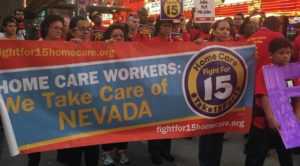Home Care Workers Secure Minimum Wage, Overtime Protections
In 1975, the Labor Department made a far-reaching decision – home care workers who assist the elderly and disabled with basic tasks were “companions” exempt from the minimum wage laws, much as babysitters were. With the aging of our society, the ranks of home care workers rapidly grew. Moreover, a job category that was once dominated by family members and community-based nonprofits was increasingly filled by employees of for-profit firms. Many, even while diligently caring for our parents and grandparents, were counted among the ranks of the working poor. Yet for forty long years these denied the protections of the Fair Labor Standards Act.
That ended in 2015, when the Department of Labor implemented new rules that made clear that home care workers paid by “third-party employers” were entitled to the minimum wage – and, probably more importantly, overtime wages. (Many patients require round-the-clock assistance, and home health care workers say they are routinely kept in service well beyond an 8-hour day.) The Home Care Association of America sued to block the rules, but its legal challenge came up empty on June 27 when the Supreme Court refused to hear the case. For details see Home Care Workers Can Finally Claim Victory in the New York Times.

